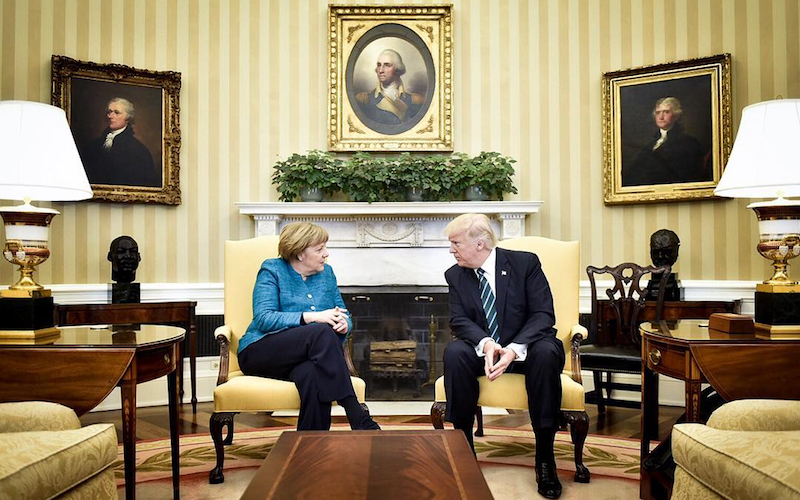
Europe has many problems, Donald Trump is the least of them.
“La Donna E Mobile,” from the opera Rigoletto, illustrates the fickleness of a woman’s interest in men, much can be said of President Trump and his administration’s stance towards Europe.
Despite his alpha status, Donald Trump’s deal making finesse will not contribute to the break down or renaissance of Europe. Fortunately, history has an uncanny knack of repeating itself. Writing in 2015, Foreign Affairs scribbled “Vladimir Putin might be the leader who finally succeeds in pushing Europe to cooperate on defence after all others have failed.” A recent Eurobarometer survey revealed 56% of people believe the EU is going in the wrong direction, so why is Jean-Claude Juncker hell bent on a pyrrhic victory?
As Charlemagne’s would-be descendants met in Malta, on February 2nd, 2017, the President of the European Council, Donald Tusk, reminded dreary eyed onlookers that Europe is facing incredible challenges from Trump, Erdoğan, Putin, China and radical Islam. Faced with these challenges, including disillusioned youth across the Union and its “lost decade,” it’s little wonder that the EU needs to reclaim credibility and none more so than in political and economic freedom.
The first rule of an unfair club is?
In this regard, the President and his Top Trumps might be onto something. Earlier this year, the European Commission and IMF pleaded with Germany to take advantage of record-low borrowing costs and increase investment. At stake is the world’s largest current account surplus which in 2015 stood at €257 billion. It is this imbalance which has caused Donald Trump to lash out at Germany, labelling the EU a vehicle for German interests, precisely because the US runs a trade deficit with the EU which is dominated by a strong German economy. Less fortunate members of the euro zone have been hurt the most due to weak growth.
However, whilst the Trump propaganda machine continues to spurt out unknown unknowns, French Finance Minister Michel Sapin is convinced this will lead to “Europeans closing ranks.” He is not the first to say such things. Chancellor Merkel emphasized “Europeans have our fate in our own hands.” Unfortunately for Merkel, this couldn’t be further from the truth. Only twice this millennium have Europeans bonded closely. In 2003, the continent witnessed mass protests over the Iraq War and more recently they have been seen hair-pulling over Obama’s Transatlantic Trade Investment Partnership (TTIP) deal, despite the fact that 53% of Europeans are in favour of such an agreement and 68% still sing praises for free trade. Furthermore, it seems European identity has strings attached to it. Where was this unity when the Russian bear, Vladimir Putin, annexed Crimea? With Europe bent over a gas pipeline, and the Integrated Defence Force still an echo chamber, Europe did nothing.
With Trump’s flaunted trade war, could Europe really withstand the potential 45% tariff hikes the orange sun-God has been shouting for? It’s hard to say, but the biggest loser from this would probably be the EU, which after China, is America’s preeminent trading partner. However, the president does have substantial powers at his disposal if Congress doesn’t play ball. The 1974 US Trade Act, grants the POTUS (President of the United States) the power to impose a 15-20% tariff hike for 150 days, enough to cause heads in Brussels to spin. Nevertheless, Europhiles cite these and other existential threats as a catalyst for binding the union further but with only 35% of people declaring love for the project, all is not well.
Throughout his on-off affair with the EU28, Donald Trump has been a key Eurosceptic. Speaking on CNBC on June 19th, 2013, the businessman made several jibes at the “great opportunities in Europe.” Such cowboy talk might appeal to nativists and America First policy junkies but goes to show his lack of experience can’t make Europe any worse than it is already. He desperately wants to see the Euro disintegrate, which has compounded the slow recovery from the bloc’s sovereign debt crisis. With Greece requiring yet another tranche of cash, how long can Europe tolerate this?
A Walled America
Distortions abound with President Trump whipping up animal spirits and Mervyn King preaching the times are “radically uncertain.” The week commencing March 20th appeared to vindicate this sentiment. Investors started questioning the ability of “The Donald” to enact his policies, leading to a drop in equities. If we needed further evidence, even healthcare reform is proving tough to pass through Congress. This is why Donald Trump won’t make or break Europe. Congress, unwilling to be humiliated coupled with America’s checks and balances, will tame his pen but not his mouth.
However, President Trump is correct: if the nations of the formidable trading block were able to print their own currencies, this never-ending crisis would disappear relatively quickly. None of this is news to the German Finance minister who points the finger at the EU. “Germany doesn’t have its own monetary or currency policy.” With a possible retrenchment of America and a two-speed Europe in the cards, the cold hard truth is: Europe faces its own make or break reality.

